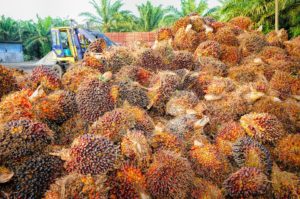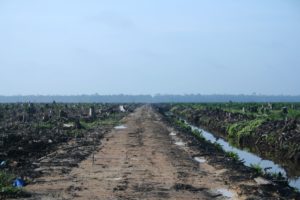Palm oil: environmental impact and sustainability
Palm oil, now the world’s most popular vegetable oil, epitomizes global tensions between environmental preservation and economic development of the Global South. Although oil palms are an ancient staple crop, palm oil use exploded in the last few decades due to its versatility and crop efficiency, producing unequaled oil yield per acre. Aside from cooking oil, palm oil is an ingredient in a wide variety of common items such as toothpaste, makeup, baked goods, and bio-diesel. Requiring only half as much land as other vegetable oil sources, palm oil quickly rose to one third of global oil consumption ringing in 72 million tons in 2018. However, as global demand grows, with a projected market value of $88 billion by 2022, concerns regarding its sustainability have risen to the forefront of environmental resilience discussions.

Today, 90% of the global supply of palm oil is sourced from Southeast Asia. Indonesia and Malaysia alone cultivated over 15 million hectares in 2014, up from 2.6 million hectares in 1990. As a result, the oil palm is considered a major contributor to both tropical deforestation and also Southeast Asian economies. Remote sensing studies in 20 countries showed that 45% of oil palm plantations in Southeast Asia were forests in 1989, resulting in the mass dislocation of several endangered species. Although disputed, studies from the European Parliament show that palm oil could be responsible for up to 40% of global deforestation. As a result, the projected growth would further encroach on crucial habitats for great apes, forest elephants, and other threatened species. Moreover, air pollution from deforestation fires in Indonesia accounted for half of Indonesia’s greenhouse gas emissions in 2015, and contributed to approximately 12,000 premature deaths. Without a viable alternative, the massive public health and environmental crisis is projected to continue.

Despite the environmental risks, critics question the value of alternatives. As Smithsonian Magazine argues, a boycott of palm oil would not curb deforestation, seeing as alternative vegetable oil crops such as coconut or corn cannot yield even a third as much oil per acre, nor does the oil palm require as many pesticides and chemical fertilizers. Environmental NGOs such as Mighty Earth encourage palm oil growers to plant on already-deforested land, but in the meantime, they warn against boycotting palm oil altogether – as stated by Katie McCow of the Carbon Disclosure Project, “that would mean shifting problems onto another commodity.” The Roundtable on Sustainable Palm Oil (RSPO) is the most hopeful prospect for reforming palm oil production, seeing as its diverse membership includes plantation companies, processors and traders, consumer goods manufacturers, retailers, and financial institutions that seek to transform palm oil markets by making sustainable palm oil the norm. Strengthening the Roundtable on Sustainable Palm Oil (RSPO) standards of practice is a major target for environmental NGOs, as rolling back commercial deforestation is key to curbing global carbon emissions and fostering environmental resiliency.
Giving up palm oil might actually be bad for the environment: Smithsonian Mag
Palm oil is unavoidable. Can it be sustainable?: National Geographic
Study on the environmental impact of palm oil consumption and on existing sustainability standards: European Commission, DG Environment
No, palm oil is not responsible for 40% of global deforestation: Phys.org
On palm oil and deforestation of rainforests: European Parliament, Committee on the Environment, Public Health and Food Safety
The World Bank Group Framework and IFC Strategy for Engagement in the Palm Oil Sector: World Bank and IFC
2nd public consultation – RSPO principles and criteria review: Roundtable on Sustainable Palm Oil
Over 60 NGOs call for stronger reforms to the Roundtable on Sustainable Palm Oil (RSPO) standards: Mighty Earth
